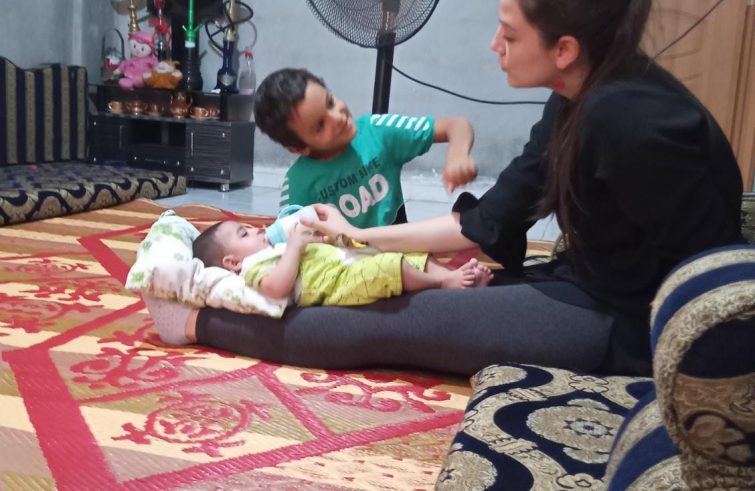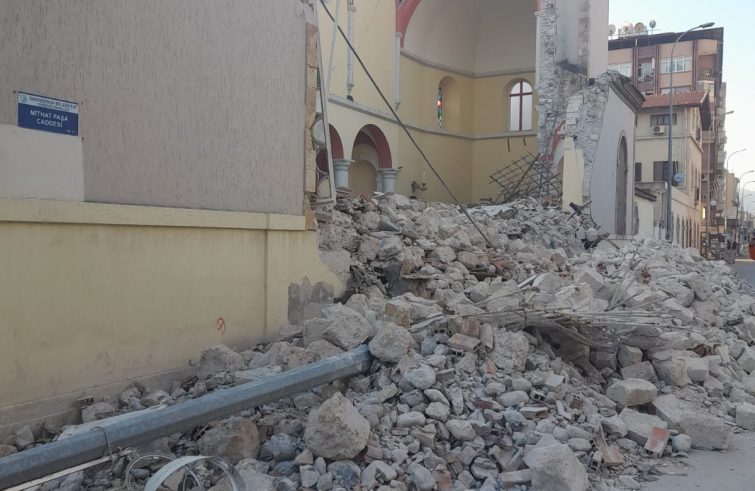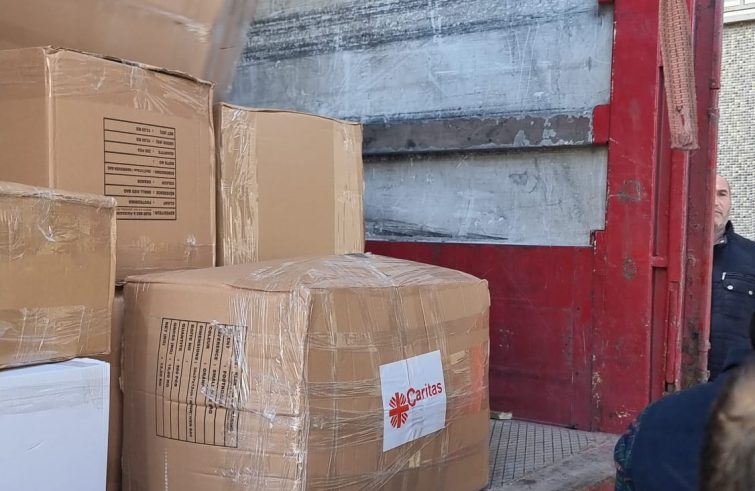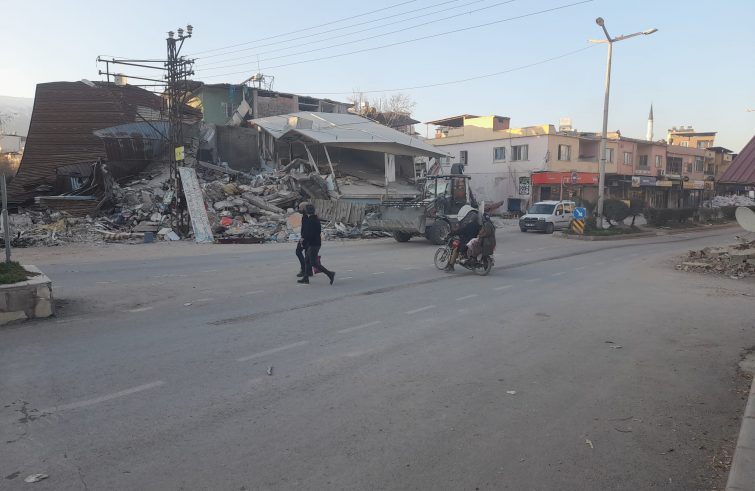
“Villages have already turned into ghost towns. Residents are abandoning the worst affected areas. We are coordinating efforts with the dioceses of Istanbul and Izmir to provide shelter to the displaced.” This is the ‘new face’ of the earthquake emergency: people fleeing cold temperatures and rubble, in search of a safe shelter. Giulia Longo, Caritas Turkey’s national coordinator for the earthquake emergency, reports on the situation to SIR. Born in Italy, she was living in Gaziantep before the earthquake. Her house was destroyed by the quake. She is now in Istanbul coordinating Caritas emergency aid for all the affected regions.
“Many of us have lost their homes, their friends, their beneficiaries, their projects”.
“Our job right now is to coordinate efforts with the Caritas confederation as a whole and get technical assistance from an emergency group that includes two workers from Caritas Italy.” Arranging an appointment with Giulia is not easy. She’s busy answering the phone and attending “emergency meetings”, she says, apologising. Caritas workers are coordinating the logistics from Istanbul together with the rescue team. “Their job is to identify safe and secure routes for the delivery of emergency aids,” Giulia explains. “We also started visiting the affected sites to see what can be done with the support of local staff,” she adds. After the first emergency, the coming hours will be important in terms of relief efforts.
 The situation in the earthquake-affected diocese of Anatolia “is catastrophic.” The diocesan director is on the front line of relief efforts in Iskenderun with the support of Caritas Anatolia personnel. Residents need everything – most importantly, they need drinking water, and access to electricity and natural gas. Almost 10 days after the earthquake, Caritas Turkey is focusing its efforts on two areas, firstly outside the area affected by the earthquake, welcoming displaced persons and arranging storage facilities and warehouses for the arrival of truckloads of humanitarian aid. Caritas workers are also involved in “the distribution of food, warm meals, blankets and clothing in earthquake-hit areas, having received the first permits. The local church is sheltering approximately seventy people in the only safe premises of the Iskenderun diocese. Now that roads have been cleared, we are finally reaching the neighbouring villages where our diocese had been actively at work even before the earthquake, from Antioch to Gaziantep -areas located at the epicentre of the earthquake.”
The situation in the earthquake-affected diocese of Anatolia “is catastrophic.” The diocesan director is on the front line of relief efforts in Iskenderun with the support of Caritas Anatolia personnel. Residents need everything – most importantly, they need drinking water, and access to electricity and natural gas. Almost 10 days after the earthquake, Caritas Turkey is focusing its efforts on two areas, firstly outside the area affected by the earthquake, welcoming displaced persons and arranging storage facilities and warehouses for the arrival of truckloads of humanitarian aid. Caritas workers are also involved in “the distribution of food, warm meals, blankets and clothing in earthquake-hit areas, having received the first permits. The local church is sheltering approximately seventy people in the only safe premises of the Iskenderun diocese. Now that roads have been cleared, we are finally reaching the neighbouring villages where our diocese had been actively at work even before the earthquake, from Antioch to Gaziantep -areas located at the epicentre of the earthquake.”
 In this emergency situation the Turkish Bishops’ Conference has made it its mission to “intervene in places where no one else is taking action, reaching out to the most disadvantaged and the most neglected people.” ‘”What’s most important now is for us to know who is not benefiting from aid and who is not officially included in assistance networks. In short, it is important that we reach out to the minority within minority groups”, says Giuia. The coordinator of Caritas Turkey points out that Anatolia was facing extreme vulnerability already before the earthquake, due to the economic crisis, the presence of five million refugees in the country, and the situation at the Syrian border zone “whose wounds run very deep.” “It’s a tragedy that hit a pre-existing tragic situation,” Giulia remarks. It brought to the fore “everything good but also everything bad that exists here, namely the large-scale show of solidarity that has emerged but also situations of systemic struggle and conflicts.” Giulia mentions “situations of inequality” that have unfortunately developed over the years of war, “between first-class and second-class refugees”, between “would-be refugees” and people displaced by the earthquake. Caritas efforts now aim to reach the most distant villages. “Our online counselling service is still open. We are asking people about their needs. We also provide spiritual support because these people have gone through the trauma of their flight from the war worsened by the trauma of the earthquake. They were doubly displaced”. Caritas Turkey is likewise concerned about the situation of minors who have lost both parents in the earthquake.
In this emergency situation the Turkish Bishops’ Conference has made it its mission to “intervene in places where no one else is taking action, reaching out to the most disadvantaged and the most neglected people.” ‘”What’s most important now is for us to know who is not benefiting from aid and who is not officially included in assistance networks. In short, it is important that we reach out to the minority within minority groups”, says Giuia. The coordinator of Caritas Turkey points out that Anatolia was facing extreme vulnerability already before the earthquake, due to the economic crisis, the presence of five million refugees in the country, and the situation at the Syrian border zone “whose wounds run very deep.” “It’s a tragedy that hit a pre-existing tragic situation,” Giulia remarks. It brought to the fore “everything good but also everything bad that exists here, namely the large-scale show of solidarity that has emerged but also situations of systemic struggle and conflicts.” Giulia mentions “situations of inequality” that have unfortunately developed over the years of war, “between first-class and second-class refugees”, between “would-be refugees” and people displaced by the earthquake. Caritas efforts now aim to reach the most distant villages. “Our online counselling service is still open. We are asking people about their needs. We also provide spiritual support because these people have gone through the trauma of their flight from the war worsened by the trauma of the earthquake. They were doubly displaced”. Caritas Turkey is likewise concerned about the situation of minors who have lost both parents in the earthquake.
“We are aware that major emergencies such as this, on such precarious and insecure borders, cause situations of illegal trafficking that are even worse than illicit adoptions. This applies to both children and women. We are concerned and we are helpless because ours is a small organisation and we have no power.”
 An appeal. “The situation is much worse than it appears in the media,” the Italian coordinator says without mincing her words. “We are dealing with a country that has very restrictive legislation that does not recognise the Catholic Church minority community, and therefore as Caritas we face major difficulties. We call on the institutions and authorities to listen to us with the same attention that we are paying to these people in this tragedy”.
An appeal. “The situation is much worse than it appears in the media,” the Italian coordinator says without mincing her words. “We are dealing with a country that has very restrictive legislation that does not recognise the Catholic Church minority community, and therefore as Caritas we face major difficulties. We call on the institutions and authorities to listen to us with the same attention that we are paying to these people in this tragedy”.










